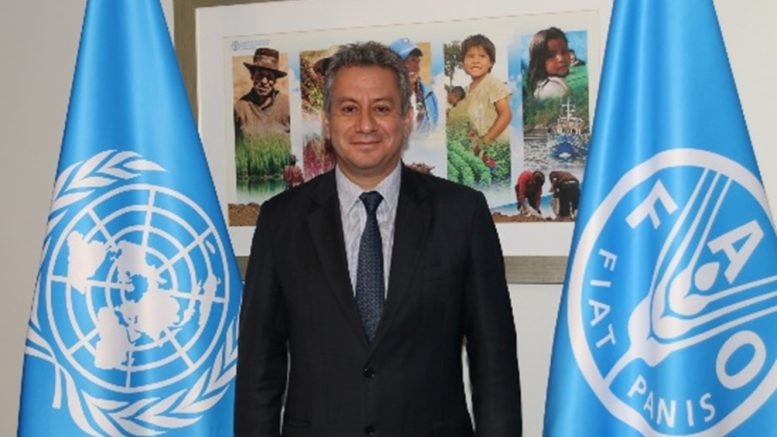“Achieving the goal of zero hunger by 2030 is a global challenge, but although the entire world is still far from achieving this goal, Brazil has shown…”
Jorge Meza is a representative of the Food and Agriculture Organization of the United Nations – FAO in Brazil, a forestry engineer from the Federal University of Paraná, a specialist in economic engineering and a master in forestry from the University of Göttingen.
AgriBrasilis – Will Brazil reach its hunger reduction targets by 2030?
Jorge Meza – Achieving the goal of zero hunger by 2030 is a global challenge, but although the entire world is still far from achieving this goal, Brazil has shown recent progress. After leaving the Hunger Map in 2014, the country was included again in 2021. However, recent data from FAO indicate a positive trend.
The average prevalence of undernourishment in the 2021-2023 triennium was 4.2%, and in the 2022-2024 triennium, this value was 3.9%. To leave the Hunger Map again, the country needs to reduce this value to less than 2.5%. To do so, it will be crucial to maintain and intensify work with a two-pronged approach: immediate actions for vulnerable populations, such as strengthening the Bolsa Família program and school meals, and structural policies that guarantee income, employment, production and access to healthy food.
AgriBrasilis – What projects does FAO lead in this regard?
Jorge Meza – In Brazil, FAO provides technical assistance in projects focused on family farming, food security and sustainable use of natural resources, always in partnership with the Federal Government. These initiatives strengthen sustainable agricultural practices, promote access to healthy food and support public policies such as the recently approved National Food Supply Plan “Food on the Plate”.
FAO also participates in the coordination of the Brazil Without Hunger Plan and the global initiative Alliance against Hunger and Poverty, launched under the Brazilian presidency of the G20. These projects serve as laboratories for good practices and contribute to the design of lasting public policies.
AgriBrasilis – What has changed regarding food security after the pandemic?
Jorge Meza – The COVID-19 pandemic has had a profound impact on food security, with increased poverty, unemployment and inequality. The number of hungry people worldwide is expected to reach 733 million in 2023, around 150 million more than in 2019.
In Brazil, severe food insecurity reached 9.9% on average between 2020 and 2022. Since then, there has been a recovery, with the restructuring of social programs and public policies, but the indicators are still above pre-pandemic levels. The main change was the rediscovery of the importance of public social protection and food supply systems that are resilient to health, climate and economic shocks.
AgriBrasilis – Which regions are most affected by food insecurity?
Jorge Meza – According to the 2024 State of Food Security and Nutrition in the World (SOFI) report, the regions most affected by food insecurity are Africa and parts of Asia. In 2023, one in five people suffering from hunger in the world was living in Africa, the highest proportion of any region. Asia also faces a major challenge: although the hunger rate has remained stable at 8.1%, the continent is home to more than half of the world’s undernourished people. Between 2022 and 2023, hunger increased in subregions such as Western Asia and the Caribbean, as well as most African subregions.
AgriBrasilis – How are these data evaluated and what criteria are observed?
Jorge Meza – FAO uses two main metrics: undernourishment (PoU) and food insecurity based on the Food Insecurity Experience Scale (FIES). Undernourishment measures the proportion of the population without economic access to a minimum amount of calories per day, based on statistical series and models that consider food supply, inequality in consumption and energy needs. FIES is based on direct interviews with the population, assessing experiences and behaviors associated with food insecurity. The data are collected in partnership with national institutions, such as IBGE, and follow internationally agreed methodologies.
AgriBrasilis – There was a dismantling of public food acquisition policies from 2015 onwards. Have these policies been resumed?
Jorge Meza – Starting in 2015, essential policies such as the Food Acquisition Program (PAA) were discontinued, which contributed to the return of hunger. However, starting in 2023, there was a significant resumption of these policies. The Bolsa Família Program was relaunched, now reaching 55 million people. The PAA was strengthened, expanding direct purchases from family farming to vulnerable populations. There was also progress in school meals, which now reach around 40 million students, and in rural financing through the Family Farming Harvest Plan. In addition, intersectoral policies, such as the single registry of 95 million Brazilians in vulnerable situations, allowed the integration of 42 social programs. This reconstruction of public policies is essential to achieving food security in a structural way.
AgriBrasilis – How to position agriculture and food security at the center of climate negotiations at COP 30?
Jorge Meza – COP 30, which will take place in Belém, State of Pará, offers an additional opportunity to position agriculture and food security as relevant topics on the climate agenda. Food production is directly affected by climate change and, at the same time, has great potential for carbon mitigation. Family farming, in particular, plays a strategic role in this context: it is responsible for 80% of the world’s food, conserves biodiversity and can lead sustainable practices. To this end, it is necessary to ensure accessible climate financing for small farmers, increase recognition of nature-based solutions and integrate healthy eating into adaptation and mitigation policies. Brazil can lead this debate based on its experience in integrated public policies and South-South cooperation, inspiring global action.
READ MORE:

